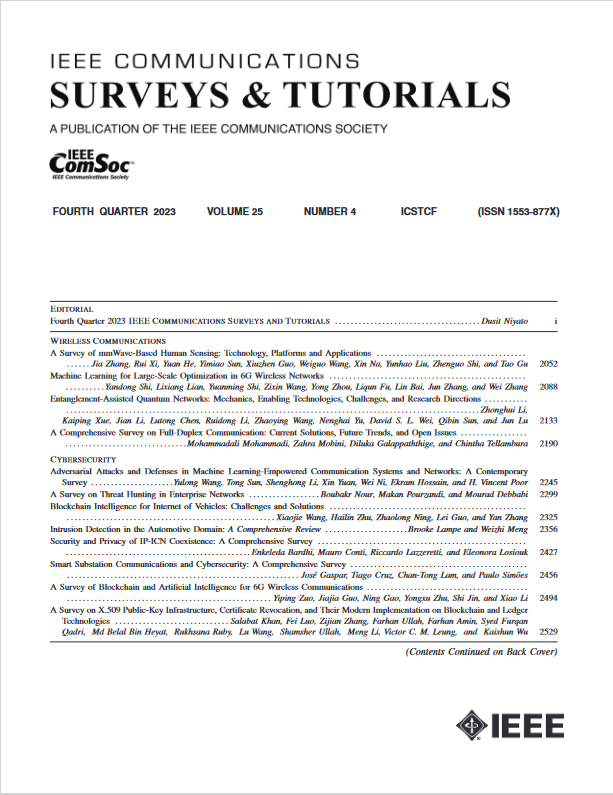Entanglement-Assisted Quantum Networks: Mechanics, Enabling Technologies, Challenges, and Research Directions
IF 34.4
1区 计算机科学
Q1 COMPUTER SCIENCE, INFORMATION SYSTEMS
引用次数: 6
Abstract
Over the past few decades, significant progress has been made in quantum information technology, from theoretical studies to experimental demonstrations. Revolutionary quantum applications are now in the limelight, showcasing the advantages of quantum information technology and becoming a research hotspot in academia and industry. To enable quantum applications to have a more profound impact and wider application, the interconnection of multiple quantum nodes through quantum channels becomes essential. Building an entanglement-assisted quantum network, capable of realizing quantum information transmission between these quantum nodes, is the primary goal. However, entanglement-assisted quantum networks are governed by the unique laws of quantum mechanics, such as the superposition principle, the no-cloning theorem, and quantum entanglement, setting them apart from classical networks. Consequently, fundamental efforts are required to establish entanglement-assisted quantum networks. While some insightful surveys have paved the way for entanglement-assisted quantum networks, most of these studies focus on enabling technologies and quantum applications, neglecting critical network issues. In response, this paper presents a comprehensive survey of entanglement-assisted quantum networks. Alongside reviewing fundamental mechanics and enabling technologies, the paper provides a detailed overview of the network structure, working principles, and development stages, highlighting the differences from classical networks. Additionally, the challenges of building wide-area entanglement-assisted quantum networks are addressed. Furthermore, the paper emphasizes open research directions, including architecture design, entanglement-based network issues, and standardization, to facilitate the implementation of future entanglement-assisted quantum networks.纠缠辅助量子网络:力学、使能技术、挑战和研究方向
在过去的几十年里,量子信息技术从理论研究到实验演示都取得了重大进展。革命性的量子应用正在成为人们关注的焦点,展示了量子信息技术的优势,成为学术界和工业界的研究热点。为了使量子应用产生更深远的影响和更广泛的应用,通过量子通道实现多个量子节点的互连变得至关重要。构建一个能够在这些量子节点之间实现量子信息传输的纠缠辅助量子网络是主要目标。然而,纠缠辅助量子网络是由独特的量子力学定律,如叠加原理,不可克隆定理,量子纠缠,使它们区别于经典网络。因此,建立纠缠辅助量子网络需要基础的努力。虽然一些有见地的调查为纠缠辅助量子网络铺平了道路,但这些研究大多侧重于使能技术和量子应用,而忽略了关键的网络问题。作为回应,本文对纠缠辅助量子网络进行了全面的综述。除了回顾基本机制和使能技术外,本文还详细概述了网络结构,工作原理和发展阶段,并强调了与经典网络的区别。此外,还解决了构建广域纠缠辅助量子网络的挑战。此外,本文强调开放的研究方向,包括架构设计、基于纠缠的网络问题和标准化,以促进未来纠缠辅助量子网络的实现。
本文章由计算机程序翻译,如有差异,请以英文原文为准。
求助全文
约1分钟内获得全文
求助全文
来源期刊

IEEE Communications Surveys and Tutorials
COMPUTER SCIENCE, INFORMATION SYSTEMS-TELECOMMUNICATIONS
CiteScore
80.20
自引率
2.50%
发文量
84
审稿时长
6 months
期刊介绍:
IEEE Communications Surveys & Tutorials is an online journal published by the IEEE Communications Society for tutorials and surveys covering all aspects of the communications field. Telecommunications technology is progressing at a rapid pace, and the IEEE Communications Society is committed to providing researchers and other professionals the information and tools to stay abreast. IEEE Communications Surveys and Tutorials focuses on integrating and adding understanding to the existing literature on communications, putting results in context. Whether searching for in-depth information about a familiar area or an introduction into a new area, IEEE Communications Surveys & Tutorials aims to be the premier source of peer-reviewed, comprehensive tutorials and surveys, and pointers to further sources. IEEE Communications Surveys & Tutorials publishes only articles exclusively written for IEEE Communications Surveys & Tutorials and go through a rigorous review process before their publication in the quarterly issues.
A tutorial article in the IEEE Communications Surveys & Tutorials should be designed to help the reader to become familiar with and learn something specific about a chosen topic. In contrast, the term survey, as applied here, is defined to mean a survey of the literature. A survey article in IEEE Communications Surveys & Tutorials should provide a comprehensive review of developments in a selected area, covering its development from its inception to its current state and beyond, and illustrating its development through liberal citations from the literature. Both tutorials and surveys should be tutorial in nature and should be written in a style comprehensible to readers outside the specialty of the article.
 求助内容:
求助内容: 应助结果提醒方式:
应助结果提醒方式:


